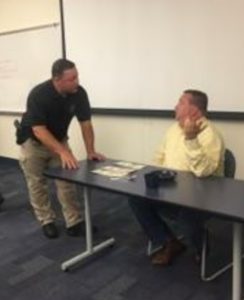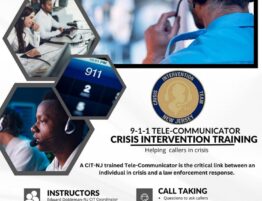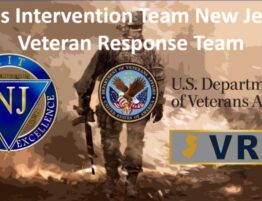July 18, 2017

Police have replaced mental health professionals on the front line for many New Jersey residents suffering crises, something not surprising to CIT-NJ Center of Excellence.
But officers within the CIT-NJ Center of Excellence Program already know what that means, as do those who need the services. Agencies have seen an increase in mental health-related calls since cuts began at the state level years ago.
Numbers like that are why a group of law enforcement officers, Mental Health Professionals, and much more gathered throughout the state for a week of training that would certify them as members of the New Jersey Crisis Intervention Team.
Learn more: What is CIT?
 They are learning to earn the right to wear a CIT pin on their chests, and they won’t be the last. Other session are set for over 13 New Jersey Counties, officials and the CIT-NJ Center of Excellence Program would like to expand to all 21 New Jersey’s Counties.
They are learning to earn the right to wear a CIT pin on their chests, and they won’t be the last. Other session are set for over 13 New Jersey Counties, officials and the CIT-NJ Center of Excellence Program would like to expand to all 21 New Jersey’s Counties.
The certification doesn’t come with extra pay. It can thrust officers into situations where one simple action might trigger an already fragile person into harming himself or others.
But it does equip them with vital de-escalation skills, something that New Jersey lawmakers seek.
They undergo 40 hours of training, learning about different types of mental illnesses, medicines, communication skills, “less lethal” techniques, and much more, as well as site visits to local facilities and presentations from mental-health professionals and others. Then, the participants pair up for role playing exercises.
At the last session, there were officers from Camden, Pine Hill, Collingswood, Gloucester Township. and Winslow Township police departments, correctional officers from the Camden County Correctional Facility, Probation and Parole officers and security officers from local hospitals as well as county colleges.
Role playing with realism
TRAINERS DON’T HOLD BACK
 An air of playful nervousness fills the training room at the Camden County Emergency Training Facility as the students here are about to pair up for their final tests.
An air of playful nervousness fills the training room at the Camden County Emergency Training Facility as the students here are about to pair up for their final tests.
Each pair goes through scenarios, allowing each officer a chance to take the lead. The role plays can range from a consumer — the name used for those officers assist, instead of subject or suspect — struggling because they’re off their medication to suicidal veterans dealing with PTSD to domestic disputes. All are based off the trainers’ experiences in their own jobs.
“Always keep your cool,” State CIT-NJ Director Edward C. Dobleman tells them. “The biggest weapon you have is between your ears.”
The first two are ready so the trainers prepare a situation.
An off Broadway Actor Joe Jacobs, who has been volunteering with CIT-NJ Center of Excellence since it’s beginning in 2007. Jacobs portrays a veteran off his medication who is upset and delusional and shows no interest in getting help. The goal for Officers are to get control of the scene using officer safety and de-escalation, as well as getting Jacobs to agree to go for help.
“I need ya to calm down for me,” one officer pleads as Jacobs rocks back and forth. The Officer asks Jacobs if he can take him somewhere to make him feel better, which prompts aggression as the officers are not listening to him and his concerns.
After some time the Officer begin to use their CIT techniques and things start to slow down. Jacobs agrees to go with the Officer after they continue to talk to him in a calm voice and promises Jacobs that they are there to help.
Jacobs stated: “When I heard about the CIT-NJ program, I wanted to be involved with it,” he said. “I’ve known people in the past who’ve had mental behavior disorders, and I wanted to be the one who helped them get the help that they needed in a crisis while also helping the police.” “We all want to be safe.”
‘Officer with a pin’
FAMILIES, CONSUMERS GROW TO TRUST
 CIT County Coordinators, State CIT Director and other public officials now welcome officers when they arrive for training. They instruct them on things like mental health overview and the DSM IV, veterans outreach, legal issues, excited delirium, active listening, de-escalation, substance abuse, co-occurring disorders, Alzheimer’s and other forms of dementia, developmental disabilities, medication, self-care, less lethal techniques and putting what they’ve learned into action.
CIT County Coordinators, State CIT Director and other public officials now welcome officers when they arrive for training. They instruct them on things like mental health overview and the DSM IV, veterans outreach, legal issues, excited delirium, active listening, de-escalation, substance abuse, co-occurring disorders, Alzheimer’s and other forms of dementia, developmental disabilities, medication, self-care, less lethal techniques and putting what they’ve learned into action.
When the officers head back to their jobs, the new pins they wear on their chests make an impression on consumers. It shows when calls are made to police.
“They would call in, ‘I need an officer with a pin,'” said Edward C. Dobleman the CIT-NJ Director. “They’re referring to the CIT pin.”
Consumers and family request CIT officers by name once trust is gained, he said. It’s a goal for officers to do follow-up visits with consumers they help, so they can build a relationship. Some departments now host special events so consumers and family can interact in a non-crisis environment.
Families also see the difference with CIT-trained officers, recognizing that CIT officers slow things down and just want their love one to go get help.
Officers are trained not to dehumanize consumers and to get them to agree to go with them for treatment, if necessary. Handcuffs still are used, however, after that agreement is reached.
Dobleman said untrained officers might not understand what is going on and use a shock device or take-down move to handle the situation. In fact, he said many officers will remark that they’ve been in similar situations before, but didn’t know what really was happening with the consumer.
He stressed that officers must work to build trust “because people remember you and your actions,” he said.
“They’re very smart. And they remember things like that, so if we lie to them or if we are aggressive with them, they’ll remember that the next time this officer shows up to their house.”
“It’s a different approach,” he said. “If an officer shows up, looking mean with a gun and everything, the person with a problem may become defensive.”
Such a situation easily can result in a bad experience and an arrest, meaning that consumer might not get the help needed. He stressed that teaching the CIT method helps ensure safety for both officers and consumers.
Dobleman acknowledged there still is resistance from some in law enforcement who believe they shouldn’t be social workers.
“But they really don’t have a choice today, because they are the first line of defense, and they have chosen to protect and serve.” he said. The goal is to provide help.
“It works for both sides. Does CIT work 100 percent of the time?” he asked. “Of course not, but it is very effective, and it does work a large percentage of the time.”
Dobleman said officers should view the training as another tool they can use to keep themselves safe. “There’s overwhelming support for this program,” he said. “In some ways, it’s outrun us.”
 Some officers from counties without CIT-NJ programs have gone through the training, and say they’d like to offer it in their counties if possible show us how. Dobleman stated he then reminds them that the program is much more then just training. Counties that host the CIT-NJ Center of Excellence Program have CIT Steering groups that meet monthly to discuses resources and procedures. If there are any problem or concerns the steering group which consists of many stake holders work together to improve or change what is needed. Dobleman stated that the program is about collaboration. We all need to be at the table working and hard because:
Some officers from counties without CIT-NJ programs have gone through the training, and say they’d like to offer it in their counties if possible show us how. Dobleman stated he then reminds them that the program is much more then just training. Counties that host the CIT-NJ Center of Excellence Program have CIT Steering groups that meet monthly to discuses resources and procedures. If there are any problem or concerns the steering group which consists of many stake holders work together to improve or change what is needed. Dobleman stated that the program is about collaboration. We all need to be at the table working and hard because:
“Everyone has bad days, whether it’s suicidal or not. We want to treat everyone with care, with dignity and respect. We want to do that through kindness and genuineness whenever we talk to people.”









